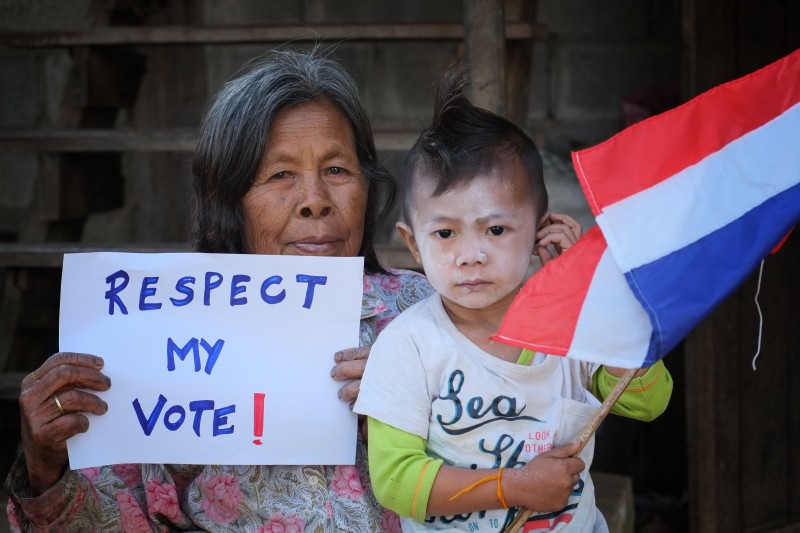
An elderly woman holds a sign that reads ‘Respect My Vote’ as she poses with her grandchild who holds a Thai national flag. Photo by Matthew Richards, Copyright @Demotix (1/15/2014)
The number of disenfranchised voters is estimated at 12 million. There are 48 million eligible voters out of the population of about 65 million.
February 2 election in numbers #ThaiVote2014 pic.twitter.com/nGBgWEZgSv
— Asina P. (@lekasina) February 2, 2014
The election took place amid rising political tension in the country. Protesters have been marching in the streets of Bangkok, the country’s capital, for several months already as they demand the resignation of Prime Minister Yingluck Shinawatra. Yingluck is accused of being a proxy of her elder brother, former Prime Minister Thaksin Shinawatra.
As protests intensified, Yingluck dissolved the parliament and announced the holding of an election. But the opposition vowed to boycott the election as it called for the creation of a People’s Council. The opposition Democrat Party claimed that a fair and democratic election cannot be achieved as long as the ‘corrupt’ Thaksin family is allowed to participate in the electoral process.
The map below shows the political division in Thailand. The north and northeast parts of the country are mainly supportive of the ruling party while the southern provinces, where most of the blocked poll stations are located, lean in favor of the opposition.
Green = Voting not blocked
Orange = Voting partially blocked
Black = Voting completely blocked pic.twitter.com/2ZmH0mIugx
— Panuwat (@tumbler_p) February 2, 2014
A BKK Post exclusive from our remote helicopter pilot Sithikorn Wongwudthianun. pic.twitter.com/jbuG92q2fp
— Terry Fredrickson (@terryfrd) February 2, 2014
Many voters who were blocked from voting went to the police to file a complaint. In Bangkok alone, 488 polling stations of nearly 7,000 were closed because of protests.
Filed police report tat I couldnt vote AND filed charges against EC at thonglor police station #vote2014 (1) pic.twitter.com/HckGUs39HO
— Maxim Silentfoot (@silentfoot) February 2, 2014
Frustrated voters at Din Daeng wave ID cards and shout, 'We want an election!' They're not going to get one. pic.twitter.com/9dCsKlpAM8
— Richard Lloyd Parry (@dicklp) February 2, 2014
Because of the high number of voting suspensions, election results were not issued and they may have to wait for several weeks until by-elections are held.
Election officials seal ballot boxes after a couple late voters in Bang Sue #Bangkok pic.twitter.com/mKIIiiAgDl
— georgehenton (@georgehenton) February 2, 2014
Saksith Saiyasombut explains that disenfranchised voters can still cast their votes at a later date:
What will happen next? There’re hundreds of polling station that didn’t open today, those will have to hold elections at a later date. Those who were obstructed in last Sunday’s advance voting can cast their in by-elections on February 23. The 28 constituencies in the South that weren’t able to file a candidate will have to start the process at a later date.
@KhunPleum expresses his disappointment over the election process:
What a sorry state of affairs Thai elections have become.
— Nattakorn Devakula (@KhunPleum) February 2, 2014
Twitter hashtags #ThaiVote2014 and #vote2014 are useful in monitoring election updates.







8 comments